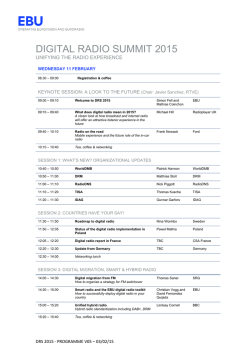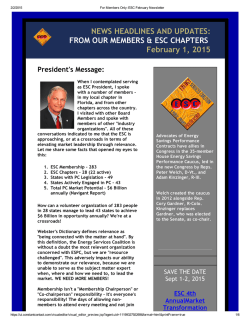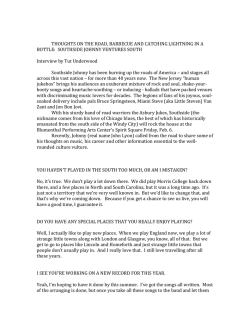
UPLOAD on EUROVISION.TV - Eurovision Song Contest
1 Country/city: Host Broadcaster: Venue BROADCASTING DETAILS Date and timing of the Semi-Final 1 Date and timing of the Semi-Final 2 Date and timing of the Final Sweden/Stockholm SVT Globe Arena Tuesday 10 May 2016 - 21.00-23.00 CET Thursday 12 May 2016 - 21.00-23.00 CET Saturday 14 May 2016 - 21.00-00.15 CET 2 participating country, there shall be a National Jury to be appointed by that country's Participating Broadcaster to vote in the Semi-Finals and in the Final in accordance Section 1.3 below. SECTION 1 THE EUROVISION SONG CONTEST 1.1) Description 1.1.1) EBU Coproduction With respect to the televoting, the song which has received the highest number of votes shall be ranked first, the song which has received the second highest number of votes shall be ranked second and so on until the last song. The Eurovision Song Contest (the "ESC") is an international coproduction by EBU Members which is carried out under the auspices of the European Broadcasting Union (the "EBU") as part of the television programme exchange known as Eurovision. With respect to the National Jury voting, the jury members shall rank first their favourite song, second, their second favourite song, third, their third favourite song, and so on until their least favourite song which shall be ranked last. Abstentions are not allowed, except that the song representing the country of the Participating Broadcaster which has appointed the National Jury shall be excluded from the vote. A maximum of 46 Active EBU Members shall be allowed to participate (the "Participating Broadcasters"). Active EBU Members from a maximum total of 26 countries shall compete in the Final. There shall be six guaranteed places therein (i.e. one for the producing organization (the "Host Broadcaster"), five EBU Members from France, Germany, Spain, Italy and the United Kingdom). Subject to a decision by the EBU in consultation with the Reference Group, the number of guaranteed places in the Final may be modified depending on circumstances. Apart from the six broadcasters with guaranteed places, all Participating Broadcasters from a maximum of 40 countries shall compete in one of the SemiFinals for the remaining places in the Final. […] 1.1.2) In both Semi-Finals and in the Final, the ranks of the televoting and the National Jury shall be combined and 12 points shall be allocated to the song having obtained the best rank once the ranks from the televoting and from the National Jury have been combined; 10 points to the song having obtained the second-best combined rank from the televoting and from the National Jury, 8 points to the song having obtained the third-best combined rank from the televoting and from the National Jury, 7 points to the next, and so on, down to 1 point for the song having obtained the tenth-best combined rank from the televoting and from the National Jury. Content The ESC is composed of three live Shows, two Semi-Finals usually taking place on Tuesdays and on Thursdays and one Final taking place on Saturdays. The Shows are produced and transmitted live by the Host Broadcaster (see the Event Schedule) and are made available over the Eurovision satellite network for live broadcast by the Participating Broadcasters. Once all the songs have been performed, the results shall be announced. The international presenters shall announce the names of the countries which have qualified from the SemiFinals for the Final. In the Final, the results in each country shall be announced in turn by the spokesperson of each Participating Broadcaster, clearly and distinctly in English or in French (stating first the name of the country concerned and then the points allocated to the songs, in ascending order). […] Each Show is a state-of-the-art, world-class television production and consists chiefly of successive live televised performances of songs by artists entered by the Participating Broadcasters to represent their countries. Each song which competes in the ESC shall be selected through a national selection to be organized by each Participating Broadcaster. The national selection is organized under the sole responsibility of the Participating Broadcaster in question. The main title of the Shows is the "Eurovision Song Contest", followed by the year during which it takes place. It shall be used by all broadcasters, although they may instead use a translation into their national language, subject to the approval of the EBU Permanent Services. If the translation is approved, the main title need not be used. Broadcasters are also permitted to include a minor title under the main title, using the name by which the ESC has been known in recent years in their respective countries. The respective winners of the Semi-Finals and of the Final shall be the song(s) which, according to all information made available to the EBU Permanent Services by the panEuropean televoting partner, has/have obtained the highest combined rank from the televoting and of the National Juries at the time of announcement of the results. The song writer(s), artist(s) and Participating Broadcaster of the winning song(s) in the Final shall receive the ESC Trophy, and the transmission of the Final shall end with a further performance of the winning song(s). The allocation of the countries to the two Semi-Finals and the position of appearance of the Host Broadcaster in the Final shall be decided by means of draws organized by the Host Broadcaster. The Shows are presented on stage, in both English and French, by the international presenters. National commentary by commentators appointed by each of the Participating Broadcasters is added to the international version of the Shows for broadcast in their respective countries. 1.1.3) The full results of the televoting and jury voting in the SemiFinals and the Final, as well as the individual ranking submitted by each jury member, shall be announced on the official website of the ESC, www.eurovision.tv, after the end of the Final and such results may be made available on National Websites of the Participating Broadcasters. Determination of the scores and of the winning song Viewers in the countries of the Participating Broadcasters are invited to vote for their favourite songs (without the possibility of voting for the song representing their own country) by means of televoting, which shall be implemented in all the countries of the Participating Broadcasters. In addition, in each 1 1.2) Criteria of eligibility 1.2.1) Songs (a) The compositions (lyrics and music) must not have been commercially released before the Release Date (see the Event Schedule). In case the composition has been made available to the public, for example, but not limited to, on online video (b) 1.2.2) Performances and artists (a) Each performance may consist of a maximum of six people on stage. No live animals shall be allowed on stage. All artists competing in a Semi-Final must be aged at least 16 on the day of the Final. All artists competing only in the Final must be aged at least 16 on the day of the Final. No artist may compete for more than one country in the ESC in a given year. Each Participating Broadcaster is free to decide the language in which its artist(s) will sing. Artists shall perform live on stage, accompanied by a recorded backing-track which contains no vocals of any kind or any vocal imitations. The Host Broadcaster shall verify respect for this rule. The stage performance shall be identical in all second Dress Rehearsals and during the live Shows. Changes to the lyrics, the artist or group (including its name), the title of the song and the language of the performance (i.e. all elements which appear in printed material such as brochures, CD covers and booklets) shall be allowed only up until the date of the HoD Meeting. Any later changes may be approved only by the Host Broadcaster, in consultation with the EBU Permanent Services, but in such a case an automatic penalty shall be applied (see clause 2.6.2 a) below). The lyrics and/or performance of the songs shall not bring the Shows, the ESC as such or the EBU into disrepute. No lyrics, speeches, gestures of a political or similar nature shall be permitted during the ESC. No swearing or other unacceptable language shall be allowed in the lyrics or in the performances of the songs. No messages promoting any organization, institution, political cause or other, company, brand, products or services shall be allowed in the Shows and within any official ESC premises (i.e. at the venue, the Eurovision village, the Press Centre, etc.). A breach of this rule may result in disqualification. (b) (c) (d) (e) (f) (g) (h) back-up member in case a member cannot fulfil his duty. […] Members of the National Juries must not be employees of Participating Broadcasters. platforms, social networks or (semi-) publicly accessible databanks, the Participating Broadcaster must inform the ESC Executive Supervisor, who shall have authority to evaluate whether the composition is eligible for participation in the Event. In particular, the ESC Executive Supervisor shall assess whether such disclosure prior to the Release Date is likely to give to the composition an advantage in the Event vis-à-vis the other compositions. The ESC Executive Supervisor shall authorise or deny participation of a composition which may have been available to the public as described above, subject to the prior approval of the Reference Group. The maximum duration of each song is three minutes. Any song/performance which is longer may be disqualified by the EBU Permanent Services after consultation with the Reference Group. 1.3) National Juries 1.3.1) Composition Members shall not have been part of a National Jury the preceding two years. Members of the National Juries must pursue one of the following professions within the music industry: radio DJ, artist, composer, author of lyrics or music producer. There shall be a balance among the members of each National Jury to ensure sufficient representativeness in terms of gender, age and background. All members of the National Juries shall be citizens of the country they represent. No member of a National Jury shall be connected in any way with any of the participating songs entered and/or artists performing in the ESC in such a way that they cannot vote in complete independence and impartiality. The names of the members of the National Juries shall not be disclosed until the EBU publishes them on the Official ESC Website (i.e. on 1 May before the ESC). The names must be made known on air during the Final by the national commentator(s) in the territory concerned. 1.3.2) Implementation All Participating Broadcasters having a contestant in a SemiFinal shall ensure that a National Jury votes in that Semi-Final. The six Participating Broadcasters with guaranteed places in the Final shall also appoint a National Jury to vote in the SemiFinal which they are required to broadcast. All Participating Broadcasters shall appoint a National Jury to vote in the Final (even if their song is not selected for the Final). The same National Jury shall vote in the Semi-Final and in the Final. Implementation of the compulsory televoting shall not exempt any Participating Broadcaster from appointing a National Jury. National Juries shall vote in all countries and in all cases. The votes of the National Juries shall be used (i) in case of a technical or similar failure in the televoting procedure, (ii) in all cases, for calculating the ranking of the songs in the SemiFinals and in the Final and (iii) to solve a tie situation should two or more songs receive the same number of televotes. The EBU Permanent Services shall decide during the SemiFinals and the Final whether only the National Jury votes shall be used. In particular, the EBU Permanent Services may decide to use such votes in a given country if an insufficient number of televotes has been registered in that country. 1.3.3) National Juries' voting procedure Each National Jury shall meet in its own country on the day of the second Dress Rehearsal of the Semi-Final in which it is responsible for voting and on the day of second Dress Rehearsal of the Final. The National Juries shall watch the live transmission of the second Dress Rehearsals and proceed to vote in accordance with the EBU's instructions included in the so-called "Green Document". All members of the National Juries shall receive their own voting sheet (to be distributed by the pan-European televoting partner) and shall be required to send a form, duly completed, in which they confirm that they will comply with the voting instructions, as well as a signed declaration in which they undertake to vote independently. Each National Jury shall vote in accordance with the instructions included in the so-called "Green Document" and shall be composed of five members, including a chairperson. In addition, each Participating Broadcaster shall appoint a After the presentation of all the songs in a given Show, each jury member shall rank all songs which have been performed in the Show in question in accordance with the system described under Section 1.1.3. 2 Each National Jury's deliberations shall be monitored by a notary, whose tasks shall be to: ensure compliance with the voting rules; to avoid any calculation error, collect, check and certify, before the ranks are allocated and entered into a computer by the chairperson: the calculation of the results and the completed voting papers established by the chairperson; send by fax all the certified voting papers to the panEuropean televoting partner. Respect for this provision shall be the responsibility of the Participating Broadcasters. EBU's rights and obligations […] (b) Distribution/Licensing Without prejudice to the other rules in this Section, all broadcasting and other rights to the Shows and the ESC are exclusively owned by the EBU, to be managed centrally by the EBU on behalf of the Participating Broadcasters. The EBU Permanent Services shall, in cooperation with an agent if needed, be responsible for coordinating all sales of the Shows (including any ESC content produced by the EBU), in whole or in part, to non-participating broadcasters from countries where rights remain available and to third parties, for the financial benefit of Participating Broadcasters and the Host Broadcaster. […] The Chairperson and the Notary shall remain available and must be attainable at any time until the beginning of the Shows. Unless any rule in this Section applies, non-participating broadcasters are not allowed to broadcast any material from the Shows (rehearsals/preparations, etc.) without the prior written permission of, and without possible payment of a rights fee to, the EBU. If it appears that votes are casted only in the intent to abuse the voting system or to false the final results or have not been undertaken in accordance with the Green Document, the EBU Permanent Services, in consultation with the Pan-European televoting partner, the independent auditor of the voting process and the chairman of the Reference Group reserve the right to remove such votes for allocating the ranks. (i) The Shows Radio […] Radio organizations (other than Radio EBU Active Members) from countries where rights remain available, may acquire the right to broadcast the Shows on their territory against possible payment of a rights fee. Each Participating Broadcaster shall ensure that its National Jury is fully independent and votes in total impartiality. It shall cooperate with the EBU and the independent auditor in connection with all matters regarding National Jury voting, 1.4) 2.4.3) Radio broadcasters shall not be entitled to sell any sponsorship package in relation to the ESC and/or in relation to their transmission of the Shows. If so required by the EBU, they shall cooperate with the EBU with respect to any centralized sponsorship guidelines or requirements pursuant to Section 3. Procedure in case of a tie in the Semi-Finals or in the Final If there is a tie between two or more songs when the combined calculation between televotes and National Jury votes is used to determine the final ranking of the songs in the Semi-Finals or in the Final, the song(s) which obtained the most votes from the televotes shall be ranked highest. Television Television broadcasters from countries where rights remain available may acquire the right to broadcast the Shows on their territory against possible payment of a rights fee. In countries where rights remain available, non-participating EBU Members shall have a first option, to be exercised within a deadline set by the EBU, to purchase the programmes for their territory. Depending on the facilities available, nonparticipating broadcasters from countries where rights remain available may also request the right to send a commentator, and/or a production team, to the ESC. Should two or more songs receive exactly the same number of televotes in a given country, the results of the National Jury shall be used to determine their respective ranks (i.e. the song having obtained the best rank from the National Jury shall be ranked highest). Should two or more songs receive exactly the same rank from a National Jury, the order shall be ascertained by a show of hands by the members of the National Jury. If there is still a tie, the final order shall be decided by the vote of the youngest member of the National Jury. (ii) Extracts The EBU shall be entitled to grant licences with respect to any extracts from the Shows and/or from the ESC Content produced by the EBU to third parties for inclusion in any audiovisual works or media products or services. The EBU is also entitled to sell any footage from the Shows to any third party within a Participating Broadcaster's territory if the EBU Permanent Services receive a request direct from such a third party or if the request covers more than one territory. Should there be a tie for the last position in a Semi-Final (because two songs have received the same number of points) or for the first place in the Final, as well as any other situation where a tie occurs, the winner shall be the song which has obtained points from the highest number of countries. If the tying songs have received points from the same number of countries, the highest number of 12-point scores shall be decisive. If the winner still cannot be determined by this procedure, the number of times ten points have been awarded shall be the deciding factor. If necessary, this method shall continue until account has been taken of the number of times one point has been awarded. (iii) ESC Logo and artwork No commercial or non-commercial entity shall use the logo or other distinctive elements of the ESC or the Shows without the prior written permission of the EBU. In the very unlikely case that after applying the above procedure in a Semi-Final there is still a tie concerning the qualifying ranks and non-qualifying ranks, the tie shall be resolved by giving precedence to the country which was earlier in the running order for the Semi-Final in question. The same procedure shall be used to resolve any other ties. (c) Free access News access Any broadcaster which does not hold any audiovisual media rights shall be granted, upon request to the EBU, except where national law or regulation provides otherwise, a total of two minutes' news access from each of the three Shows (or, if requested, from any Dress Rehearsal), free of charge for use […] 3 in regularly-scheduled general news bulletins broadcast within 24 hours of the Semi-Finals and the Final respectively. Accredited Media All accredited media shall be free to use, for purposes of the written press (including their websites) only, any material filmed by them during the press conferences, open rehearsals and the first Dress Rehearsals. (The use of any such material for audiovisual news access is subject to the rule below.) […] 2.8) Prevailing Version These Rules are drafted in English and French. In the event of any inconsistencies between the two versions, the English version shall prevail. Host Broadcaster. 4 1
© Copyright 2026




